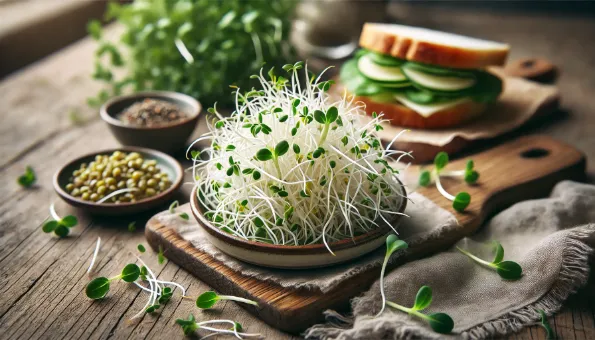Alfalfa Sprouts: Feather-Light Greens Packed with Vitamin C & Folate
A single cup weighs 8 kcal yet delivers crunch, plant protein and over half your daily vitamin K—perfect for boosting sandwiches without boosting calories.

Sprouting Tiny Seeds into a Nutrition Giant
Alfalfa (*Medicago sativa*) sprouts grow in just five days, turning dry seeds into crisp filaments rich in enzymes and **bio-active phytoestrogens**. Because they’re eaten raw, they keep heat-sensitive vitamins intact.
Nutrition per 1 cup (33 g)
|Calories|Protein|Fat|Carbs|Fiber|Vit K|Vit C|Folate|
|---|---|---|---|---|---|---|---|
|8 kcal|1.3 g|0.2 g|0.7 g|0.6 g|38 % DV|14 % DV|9 % DV|
Why Add Alfalfa Sprouts?
- **Low-calorie volume**: bulks meals for satiety with negligible carbs.
- Source of **saponins** that may support healthy cholesterol metabolism in small studies.
- **Vitamin K1** promotes bone mineralisation.
- Live enzymes can aid raw-food digestion.
Safety Notes
- Warm, humid sprouting creates risk of **Salmonella & E. coli**—buy certified pathogen-tested or sprout safely at ≤ 20 °C and rinse with 3 % vinegar.
- Contains trace **phytoestrogens**—benign for most, but those on oestrogen-sensitive medication should consult a clinician.
- Rapid wilting; consume within four days of harvest.
Easy Uses Beyond the Salad Bar
- Layer into **turkey & avocado sandwiches** for crunch.
- Blitz into a green smoothie at the end to keep texture light.
- Top ramen bowls after cooking for fresh contrast.
- Stir into omelettes just before folding to retain crispness.
Buying, Sprouting & Storage
- Look for **snow-white stems and bright green tips** with no sliminess.
- Home sprouting: soak 1 Tbsp seeds 8 h, then rinse twice daily for 5 days.
- Store in a perforated container at 4 °C; rinse again before eating.
- 1. Alfalfa Sprouts

